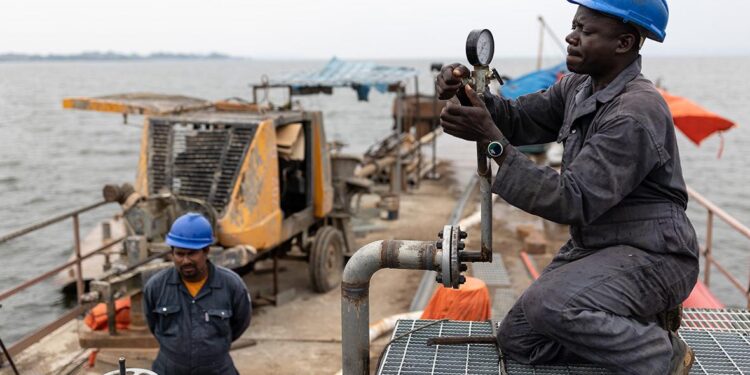Angola Announced Its Withdrawal From OPEC
Angola withdrew from OPEC, the decision was made at the Council of Ministers chaired by the President. In November, the country reduced its oil production quota in 2024 from 1.28 million to 1.11 million barrels. per day.
Angola has decided to withdraw from OPEC, the country’s Minister of Mineral Resources, Oil and Gas Diamantino de Azevedo said, Angola Press News Agency reports.
The decision was made at a meeting of the Council of Ministers chaired by President Joao Lourenço.
Since October last year, OPEC countries introduced oil production quotas: then Russia and other members of the association agreed to reduce production by 2 million barrels. per day (b/s) below the level of August 2022. Iran, Libya and Venezuela are not included in this agreement.
Why Angola is leaving OPEC
Angola’s disagreements with OPEC escalated after the country on November 30 rejected a new production quota that the organization had provided to it. Its representative in OPEC, Estevan Pedro, said that he plans to violate it: to produce 1.18 million b/d, and not the volume established by OPEC (1.11 million b/d, which was also reduced by 117 thousand b/d 30 November). “The question of whether Angola remains in OPEC is being decided at the highest level,” he added. At the same time, on November 23, Pedro said that Angola does not plan to leave the organization amid controversy over the volume of quotas.
Bloomberg noted that in June, the head of the Ministry of Energy of Saudi Arabia, Prince Abdulaziz bin Salman, pushed Angola, Congo and Nigeria to reach agreements to set production targets for 2024. The deal was reached: from the beginning of 2024, quotas will decrease by another 1.4 million b/d compared to the period from November 2022 to December 2023, to 40.46 million b/d. They will be valid until the end of December 2024.
The condition of its conclusion for three African countries was an audit that showed a decrease in oil production capacity, which ultimately led to a reduction in quotas for them.
In terms of production volume, Angola’s exit is not a significant shock for the cartel, suggested Daniil Bolotskikh, leading analyst at Digital Broker. Angola’s production in November 2023 was 1.13 million b/d against the permitted level of 1.455 million b/d. That is, the country produced less than was allowed under the agreements, and its share does not exceed 5% of OPEC production. Angola’s exit is rather dangerous because it creates an unpleasant precedent within the cartel and could affect investor sentiment, Bolotskikh noted.
Ahead of the last OPEC+ meeting on November 30, there were rumors about the reluctance of African countries to cut production, Bolotskikh said, and as a result of the last meeting, Angola’s quota was reduced to 1.11 million b/d versus 1.28 million b/d in the previous agreement. Meanwhile, the country itself stated in the summer that it would like to stabilize production at 1.2 million bpd, so this is how Angola perceives the reduction in quotas.
Angola’s exit from OPEC should have been expected because differences emerged on November 30 at an online OPEC+ meeting, noted Stanislav Mitrakhovich, a leading expert at the National Energy Security Foundation and the Financial University under the Russian government. Before this, as the expert noted, Saudi Arabia had been negotiating with Angola for several months in a row.
Angola produces 1.1 million b/d, its share in OPEC production is about 3.5%, calculated Dmitry Lyutyagin, an independent oil and gas industry analyst, but if compared with the production of the entire OPEC+, then the share already falls below 3%, and if with the global figure it is about 1.1%. From the point of view of further coordination of actions, the expert is confident that Angola, like Russia, will participate in processes related to the coordination of production volumes, distribution of volumes, and quotas. Lyutyagin explains Angola’s exit from OPEC by the fact that it does not want to work within the framework of strict quotas; accordingly, the country is more interested in operating in the OPEC+ format. According to the analyst, to a certain extent, Angola’s exit could undermine the cohesion of OPEC member countries, but if Angola ultimately simply downgrades the status of its participation, this will not mean a full exit and, in fact, Angola’s production volume within this market regulation instrument will remain the same.
Which countries have already left OPEC and how Angola’s exit will affect the market
Angola will not be the first country to leave the organization. Gabon left OPEC in 1995 and returned in July 2016. In November 2016, Indonesia announced its decision to leave the organization (the first exit took place in 2009) due to the fact that it had effectively ceased to be an oil exporter amid falling production. In January 2019, Qatar left OPEC to focus on gas production and exports.
Ecuador left OPEC in 1992 and joined in 1973. The country then re-joined the organization in 2007. In July 2017, the country’s oil minister, Carlos Perez, said that Ecuador would not be able to fulfill its commitment to reduce production by 26 thousand bpd, to 522 thousand bpd, as agreed by OPEC in 2016. He justified this by the fact that the country needs to fill the budget, and “what Ecuador does or does not do does not have a significant impact on OPEC production.” In October 2019, the Ecuadorian Ministry of Energy announced its withdrawal from January 2020, explaining the decision by internal problems that the country must solve for financial stability.
Angola’s decision is not yet final, it will be made after consideration at a ministerial meeting, Bolotskikh noted. Therefore, everything may still change, since OPEC countries’ production did not reach the established quotas of 627 thousand b/d in November. Angola is fully withdrawing from OPEC, and then, perhaps, the country will bargain on the terms of its return, Mitrakhovich believes.
If this news were sudden and had a completely negative connotation, it would have a negative impact on quotes, Lyutyagin noted. Now quotes do not change as sharply as, for example, on the news that the British BP will not transport tankers through the Red Sea.
By the standards of the oil market, Angola’s share in total oil production is significant, but one must understand that the country has not stopped producing and supplying it, the expert explained, but simply states that it will not participate in the OPEC coordination event and take on strict obligations. But the volume itself remains on the market. The question is how quickly Angolan exporters are ready and willing to increase the volume of oil supplies to the market relative to their current quotas, but this is another question – investments are needed to increase this volume. Production growth could be up to 5%, but this will not significantly affect world prices.
The agreements that were reached on November 30 are not capable of increasing or even keeping oil prices from falling, Mitrakhovich believes. The exit of Angola and the growth of production in Venezuela, which will not be restrained by restrictions, will further contribute to the fall in oil prices. True, extraordinary events, for example, the actions of the Houthis, may contribute to a slight increase in the cost of oil, but if they are not taken into account, then oil prices are objectively declining, Mitrakhovich noted, which means that OPEC+ will have to re-negotiate additional restrictions on production among the main exporters, or the level of quotas, or the level of “unilateral voluntary restriction”.







